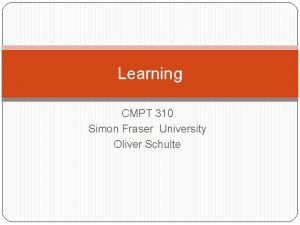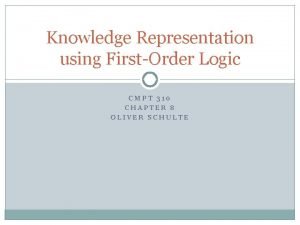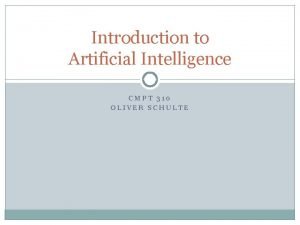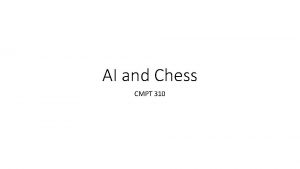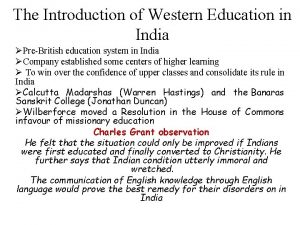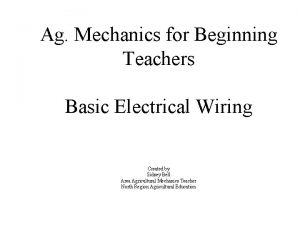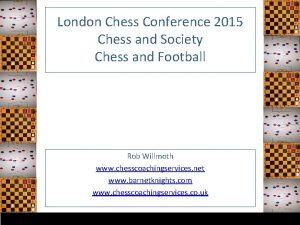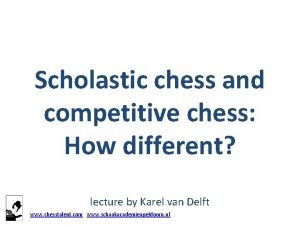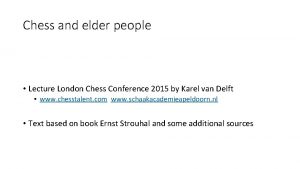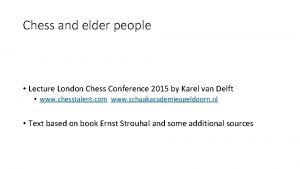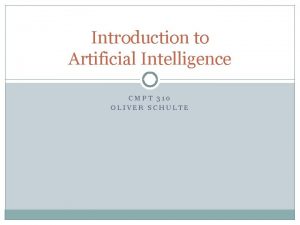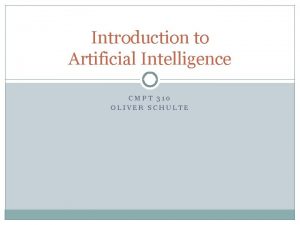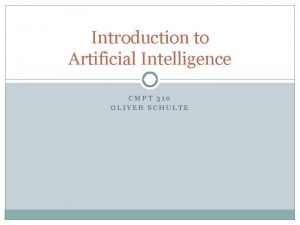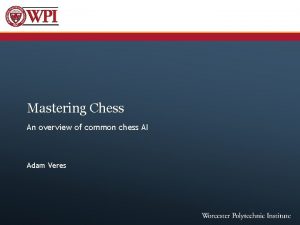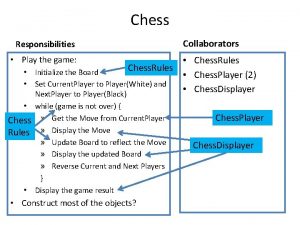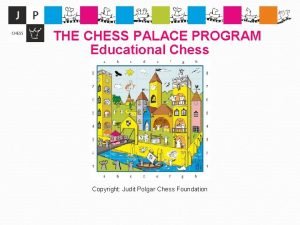AI and Chess CMPT 310 Introduction In Western














- Slides: 14

AI and Chess CMPT 310

Introduction • In Western culture, chess is a special game that has been played for 100 s of years • To be good at chess is to be intelligent and sophisticated • Great chess players are considered geniuses • So, surely, if a “machine” could play chess well, then it too would have to be intelligent … Paul Morphy 1837 - 1884

The Turk (1770 – 1854) • From about 1770 to 1854 (when it was destroyed in a fire), you could play chess against The Turk • It appeared to be an automaton, i. e. a machine that played chess on its own • And it could play pretty well • But it was a hoax! • A small human chess player hid inside the compartment on the right and made all the moves

Claude Shannon (1949/50) • Best known as “the father of information theory” • Wrote a famous paper called “Programming a Computer for playing Chess” in 1949 • Proposed the basic idea of “position evaluation” and min max search for looking ahead to find the best moves • Later this was refined to alpha-beta search, which does essentially the same thing but more efficiently • In 1950 he published another paper where he estimated that total number of different possible chess positions 10120 • There are “only” about 1080 atoms in the universe • Such a huge number means that pure “brute force” probably can’t be used to play chess well

Alan Turing: Turochamp (1948) • Alan Turing is best known for the creation of Turing machines (to help prove that some problems cannot be solved by any computer) • He was also greatly interested in AI, and created the Turing Test • Turochamp was a complete chess-playing program written by Turing and David Champernowne • They didn’t actually get it running on a computer • But it could be run by tracing it by hand, and it could play chess (although not very well)

The Kotok-Mc. Carthy Chess Program (1962) • John Mc. Carthy is famous for creating the LISP programming language, and many other contributions to AI • He also coined the term “Artificial Intelligence” • Alan Kotok was an undergrad student who worked with Mc. Carthy to create a chess playing programming • Generally considered to be the strongest chess playing program of the time • Took 5 to 25 minutes to make a move • Played full chess, but not great • Estimated to play about as well as an amateur who had played 100 games

Mac. Hack (1967) • Developed by famed “hacker” Richard Greenblatt • An influential program with a number of new ideas • First program to defeat a human in a tournament • Greenblatt himself was a pretty good amateur player, and hand-coded many chess heuristics into his program • Mac. Hack is also famous for being involved in a famous game of chess against philosopher Hubert Dreyfuss in • Dreyfuss argued that the claims of AI where vastly overblown • The poor quality of chess programs was something he often pointed out • So he played a game against Mac. Hack --- and lost

Computer Chess Grows • By the 1970 s, there were enough computer chess programs that tournaments started to be held • 1970: the first North American Computer Chess Tournament was held • 6 participants • Won by a program called Chess 3. 0 • Successors of Chess 3. 0 dominated this tournament in the its first decade (only lost the championship twice in the 1970 s!) • 1974: the first world computer chess championships • Won by the Russian program Kaisa • 1977: first consumer chess programs that ordinary people could buy

The Levy-Mc. Carthy Bet (1969) • In 1969, chess master David Levy made a bet of $1000 with John Mc. Carthy that Levy could defeat any chess playing program in the next 10 years • Levy won the bet --- in 1979 he defeated the best chess programs of the day • Levy extended his bet and offered $1000 to the first chess program that could beat him • He finally lost that bet to …

Deep Thought (1989) • Feng-hsiung Hsu developed a special purpose chess chip that was used to create the chess playing machine Deep Thought • First computer to beat chess master David Levy • First machine to beat a grandmaster in a tournament • Lost a 2 -game match to then chess world champion Garry Kasparov • Deep Thought could search about 500 million positions per second • Enough to look ahead 10 -11 moves completely • Although it also used so-called “extension searches” where it could sometimes look ahead many more moves • E. g. once found checkmate in 35 moves

Deep Blue (1997) • The Deep Thought team moved to IBM, and renamed their project Deep Blue • IBM’s nickname is Big Blue • 1996: world chess champion Garry Kasparov played a 6 -game match against Deep Blue • Deep Blue won the 2 nd game --- the first time a reigning human chess champion has ever lost a game to a computer in a match • Kasparov won the match overall, 4 -2 • 1997: Kasparov and Deep Blue played a 6 -game rematch • This time Deep Blue won the match 3. 5 – 2. 5 • This was a major media event, and generally seen as marking the turning point when computers became better at chess than the best humans • Nowadays, a chess program running on your laptop could easily defeat Deep Blue (or the human world champion)

Alpha. Zero (2017) • Alpha. Zero is generally considered to be the next major breakthrough in computer chess • Previous elite-class programs used highly tuned and carefully crafted versions of alpha-beta search • But Alpha. Zero is different • It used reinforcement learning to play chess games against itself • It was given just the rules of chess, and no other knowledge • In a few hours of self-play (admittedly on high-performance hardware!), Alpha. Zero learned to play chess about as well as the best programs of the day • In 2019, a 1000 -game match against the world champion calibre chess program Stock. Fish, Alpha. Zero • • • Won 155 games Lost 6 games Drew 839 games

Alpha. Zero • Radically different approach to chess than previous best programs • Learned all its chess knowledge through self play • Stored as a neural network • Didn’t use alpha-beta search • instead, it uses a different technique called Monte-Carlo Tree search (MCTS) • the basic idea of MCTS is to pick random successor states, and keep going until the game is played out • this is repeated thousands (or more) times • the move that is actually selected is the one that leads to the most wins • Alpha. Zero uses a modified version of this: it uses its learned knowledge to decide what move to make when simulating the games • Stock. Fish: searches about 60 million positions per second • Alpha. Zero: searches about 60, 000 positions per second

Alpha. Zero • Another remarkable fact about Alpha. Zero is that it is not specific to chess • The Alpha. Zero algorithm was also used to create (probably) the best Go and Shogi programs • Alpha-beta search programs don’t play Go well because the branching factor of Go is so much bigger than chess • This dramatic success of Alpha. Zero has sparked the imagination of many people: if a computer can learn more about chess in ten hours than humans have learned in centuries, how long before computers start to similarly out-perform humans in other disciplines? • It is important to keep in mind that the Alpha. Zero approach does not work well with all games, and there are still many hard problems that remain unsolved
